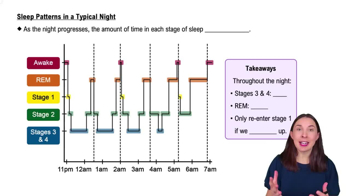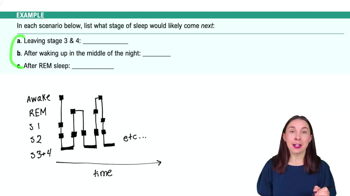Table of contents
- 1. Introduction to Psychology1h 43m
- 2. Psychology Research2h 20m
- 3. Biological Psychology2h 41m
- 4. Sensation and Perception28m
- 5. Consciousness and Sleep32m
- 6. Learning41m
- 7. Memory34m
- 8. Cognition37m
- 9. Emotion and Motivation35m
- 10. Developmental Psychology33m
- 11. Personality48m
- 12. Social Psychology41m
- 13. Stress and Health41m
- 14. Psychological Disorders44m
- 15. Treatment47m
5. Consciousness and Sleep
Sleep
Struggling with Psychology?
Join thousands of students who trust us to help them ace their exams!Watch the first videoMultiple Choice
Antwon cannot seem to focus in class today. Though he is not asleep, his mind appears to be drifting off, leading to thoughts of his girlfriend, his job, and upcoming events of the day. Antwon appears to be in which of the following states of consciousness?
A
Waking
B
Unconscious
C
Altered
D
Unfocused
 Verified step by step guidance
Verified step by step guidance1
Step 1: Understand the concept of 'states of consciousness' in psychology, which refers to the different levels of awareness of one's thoughts and feelings.
Step 2: Recognize that 'waking consciousness' is a state where an individual is fully alert and aware of their surroundings and thoughts.
Step 3: Consider the characteristics of an 'altered state of consciousness,' which can include daydreaming, meditation, or being under the influence of substances, where the mind is not fully focused on the immediate environment.
Step 4: Analyze Antwon's situation: although he is not asleep, his mind is drifting to various thoughts unrelated to the class, indicating a lack of focus on the present task.
Step 5: Conclude that Antwon is likely in an 'altered state of consciousness' because his attention is not on the immediate environment, but rather on internal thoughts and distractions.

 3:25m
3:25mWatch next
Master Circadian Rhythms with a bite sized video explanation from Hannah Gordils
Start learningRelated Videos
Related Practice


































































































![Race, Genes and IQ Differences | Bret Weinstein [Mini Clip]](https://img.youtube.com/vi/IztL_m3pd70/mqdefault.jpg)



































































































